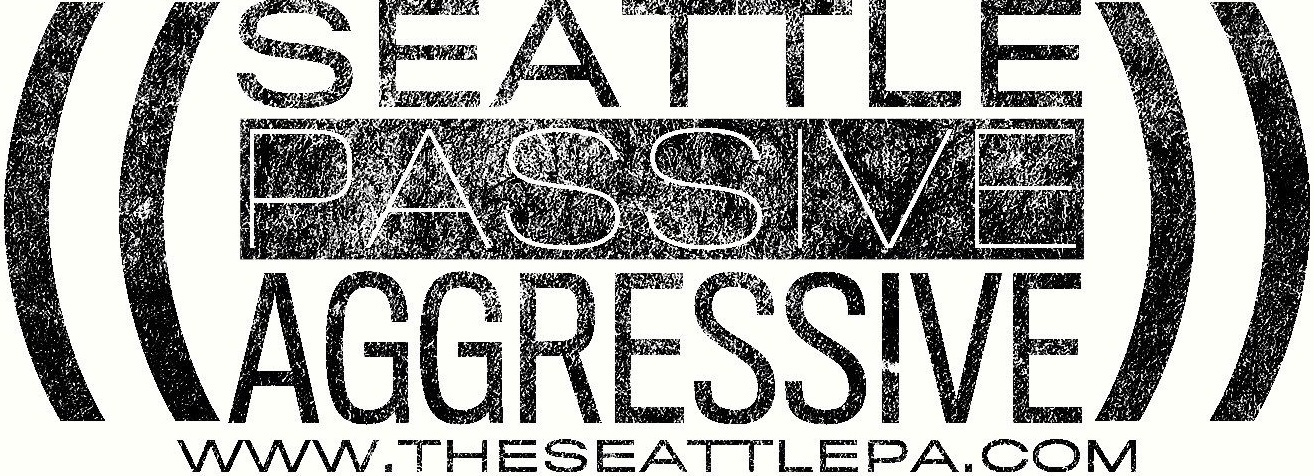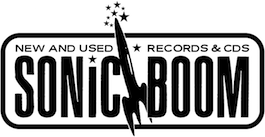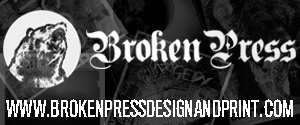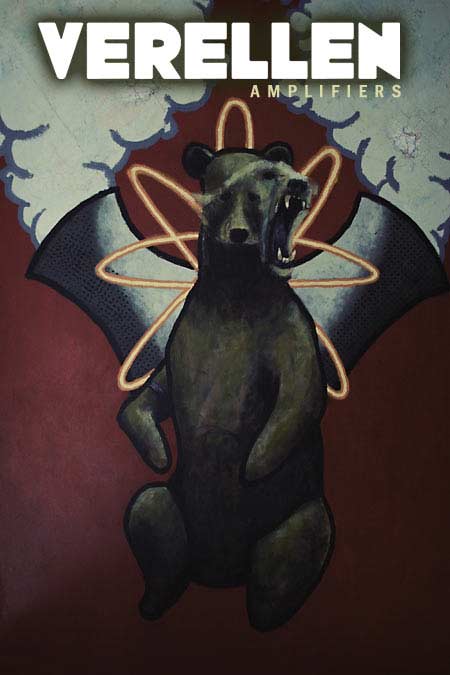Seattle Passive Aggressive Interview with Erik Danielsson of Watain
By Lee Newman
If you’re at all familiar with modern black metal, you no doubt know his face – splattered across with red and arrayed with intricate filigrees of black, hair matted with dust and blood, pupils reduced to searing pinpricks by contact lenses. Over the course of five albums, Erik Danielsson of Watain has gained a reputation as one of the genre’s most intense and theatrical wildmen. But beyond this fearsome visage lies a disciplined thinker. We spoke with Erik about Watain’s upcoming American tour with Mayhem coming to town at El Corazon January 27th, and the search for metaphysical truths.
Seattle Passive Aggressive: So you’re touring with Mayhem and Revenge in 2015; I feel like everybody’s been looking forward to this tour. And it’s an interesting one – on this bill you’ve got the originators of the black metal genre, or at least their remnants, and then one of the more extreme bands out there now, who have taken the genre and made something really different out of it. How does it feel to be on that bill, and how did the whole thing come together?
Erik Danielsson: It seems, for once, quite natural to be on that bill, because tour packages are far too often based on label politics and business strategies and stuff like that. So it feels very important to be a part of a tour that is based much more on the artistic common denominator of all the bands. That’s something we have always strived for with Watain, to end up on tours like that. It’s not every time that it works, but this time it definitely did. It feels like a very monumental thing in that sense. To do it in the US is also important because people have a tendency to appreciate these kinds of packages perhaps a little bit more in the US than they do in Europe. European audiences are a little bit spoiled with all kinds of stuff. So it feels like a very good setup for a very memorable and historically relevant tour.
SPA: Very true – when I first saw this lineup I was thinking “that’s the sort of thing that would happen in Europe. That’s a festival lineup.” That’s not the sort of thing we get very often.
ED: Yeah, yeah, kind of. I mean, it’s cool that the whole thing came together. We’ve been talking with Revenge and Mayhem separately about doing stuff together, because, like I said, with Watain we are always very keen, when it comes to doing tours, on ending up on the same tours as bands that we respect and that we actually have something in common with. Those bands, in this day and age, I can count them on five fingers. So it’s been a long time coming and it’s very cool that we can combine the whole thing. What I think we ended up with is a tour package where, you know, we have all taken our personal, separate versions of black metal that we are representing as far as possible. You have three of the most – and I hate to use the word extreme, because it’s something my mother would use – but it’s definitely three of the bands that still contribute the most to something as misused and as misunderstood as the black metal genre. I think that all of these bands still have something of relevance to bring to the table. With that being said, it seems like a very, very good tour to be on.
SPA: Of course, the live shows for Watain are always very involved, especially the ritual aspect of it. When Watain are onstage it almost seems like you guys are inhabiting new personas, channeling parts of yourselves. I feel like that’s a commonality between Mayhem and Revenge as well. It’s music that takes you to this other place, music that takes your outside of yourself.
ED: Yeah, I agree. And I think that it’s not only a common denominator for these three bands, but I think it’s a common denominator for any bands that see their music as something bigger than their own selves. The Doors had the same viewpoint on music. So did a lot of relevant rock bands. I think that’s a position you have to put yourself in, in order to make something that lasts for more than a minute in this society we live in now, where people’s cultural absorption is very fast food oriented, if you know what I mean. I think that the stuff that actually lasts, and that goes for older music as well as stuff from the ‘60s, ‘70s, ‘80s and on, has always been bands whose members have taken their own music with such a serious approach that they themselves as individuals have become of less importance in comparison to what they’re doing artistically.
SPA: A few years ago, when Watain played here in Seattle on the tour with Behemoth, we got to watch you attack some poor security guard onstage with your mic stand because he was trying to sneak around and put out candles. How do you deal with the adversity toward the performances? I know a lot of venues will restrict the fire of the blood. How do you feel about compromising on that?
ED: Adversity is a very natural part of what we are doing. Watain is a counteractive force toward the status quo of the society that we live in. We are the enemy, in that sense, and taking that role upon oneself presents a lot of adversity, a lot of opposition, a lot of complicated situations like those you mentioned. I would lie if I said that I completely despise it. There’s something in it that I like, because it means that you are on the right path when people get upset, to put it very simply. If we wouldn’t be facing adversity with what we are doing, we would be doing something wrong. But then again, for this tour, I’m pretty sure it takes one Google click to find out what kind of bands the promoters have been booking this time. It’s not really mama’s boys that are coming to town! So I think there will be less of that on this tour. Hopefully promoters will be pretty well prepared for something a little bit out of the ordinary. And it will be, for sure. We are taking the stage show to a new level with this tour.
SPA: You always have great thoughts on what it means to be the adversary. I was reading up on some of your older interviews, there was one with Invisible Oranges earlier this year, where someone had asked a question about how black metal sometimes has this National Socialist undercurrent in certain corners. They asked for your thoughts, and you had said that if there was ever some sort of Holocaust event, we [Watain] would be the first ones to be killed. I think that’s a very powerful position to hold, especially now that it’s in the public eye again in metal, with speculative reports on Inquisition being Nazis or other bands being Nazis. I feel like your thoughts on it are very refreshing instead of being like “yeah, Nazis were extreme so we think that’s cool.” Has it ever been hard coping with those sorts of allegations directed toward Watain?
ED: It’s not hard to deal with them, but it’s pretty tiresome because we do have quite a strict and refined form of ideology, even religion that we represent. It is tiresome to deal with people that do not even take that thing into consideration, but instead try to make it into something that it’s very far away from. I’m very tired of talking about politics, because Watain is not a political band. For me, it’s a very irrelevant subject in the world of Watain. Politics are interesting, just as whatever great power in this world is interesting. Of course, power is interesting in every sense, the way it moves, and its currents. It is interesting, of course, and has relevance, but it is certainly not a central aspect of anything that we are doing. It is just one of thousands of small manmade things. For me we are dealing with much greater things than something as small or as futile as politics or National Socialism. We are dealing with truths that make all those things seem like the smallest things in the world. We are dealing with profound, arcane truth. We are dealing with powers that eat politicians for breakfast. That is why it’s always like I talk about it for ten minutes and then I’m like, okay, can we get on to what this is really about? So it’s tiresome, but it’s not hard to deal with. I have my opinions and all those things – if people are interested in those, they can look up other interviews. But I don’t care to talk about politics.
SPA: That’s a great segue, actually. A lot of Watain’s lyrics are clearly about very much larger concepts, basically Kabbalistic concepts. Some of the spoken passages in [2012 concert video] Opus Diaboli espouse that same sort of philosophy. How did you become interested in Kabbalah, and the sorts of arcane sciences in that realm?
ED: Well, it’s been a very natural process of evolution, but to go into detail about how that process has been developing is a very vast subject. To try to put it as simply as possible, if you find a call within yourself, if you find a certain goal or a certain aim within your life, which I did when I found Satanism, I think that everything you do and everything that you take upon yourself, every endeavor that you choose to become a part of, is a result of that goal. It’s a result of that spark within yourself. It’s a result of that calling. Naturally, you will discover things along the way that make you see things more clearly. To me, the religious path is always about making things more clear, more stern, more defined, so you may work with it with more ease and more swiftness. That includes learning about various systems of beliefs, and various ways of working with these kinds of ideas and beliefs. Kabbalism is one of many, many interesting aspects on how to work with the religious reality as a whole. It’s a very natural process to become involved in all these various aspects that Satanism is built upon.
SPA: I don’t know about you, but I had a very traditional religious education growing up. But the thing about Satanism and other schools of thought is that they were always just around the corner, but very much forbidden. You would sort of touch on them in certain texts, and then your professors would go “no, we shouldn’t pay attention to that; that’s not what we’re supposed to do here.” I find it interesting that the really profound meanings are going to be hidden away because they’re – and I know you mentioned that the word extreme can be tiresome – they are the most extreme, and the most enlightening.
ED: That’s what they say: the lover of knowledge, those that search for knowledge, they are not afraid odeep waters. They are afraid of the shallow waters, because in shallow waters there is nothing to be found. You have to step into the deep waters, you have to go far out into that primordial ocean in order to begin your search. That is very much what Satanists are urged to do. We search where it is forbidden to search.
SPA: Black metal, but other genres as well, has always been a gatekeeper for fringe schools of thought. How do you feel about maybe being the person who introduces some of these concepts to listeners, some of whom may think that spirituality in metal tops out at “hail Satan, burn churches, kill your parents,” very primitive stuff? Does it feel good to be that messenger?
ED: Everyone is primitive at some point in life. We all start out with a very primitive set of beliefs. Primitive is good; it’s definitely not to be underestimated because the primitive is where the spark lies. That’s where the primal fire lies. It’s very important to allow yourself to be primitive, but regarding my role as someone who might lead people into certain things, I’ve never been particularly interested in that whatsoever. It’s been a result of the work that I have chosen to take upon myself, but we have never been out on a mission to educate people or to show them a way to something. It’s just a result of what we are doing, but that has never been the goal of the work we are doing. The work we are doing has always been about direct communication between ourselves and our gods. That is what we are here to do.
SPA: So you’re not the cult handing out flyers on the street: “join us!” It’s just a side effect of something more personal?
ED: We do not work like that, but I definitely respect people that do. I definitely do. I think that religious zealotry, as bad as that word sounds, has a very charming and welcoming cling to it, in my world. We need fanatics, we need true zealots. We need people who are ready to go into the street and grab people by the neck. I think that’s a beautiful thing, but that’s not what we are doing. We are a religious rock group that communicates with our gods. And if that inspires people to search for something, great! I hope you search well.
SPA: Back to the live shows for a sec: you’ve come through Seattle a few times. I noticed you don’t play a whole lot off the first two albums. Is there any reason for leaving them out of the sets?
ED: No, when you’ve released five albums it gets extremely complicated to make a setlist that covers all the fields. Because we’ve been doing this for sixteen of seventeen years now, of course you need renewal, and you want to feel that you are progressing, that you are moving forward and not stagnating. I think that’s a very big reason why we are constantly incorporating new material into the sets, because we still feel that the difference between the new material and the old material is not that vast. We are still doing very much the same thing, albeit a bit refined. Then again, it’s also funny. People are asking for material from the first album but then, when we do a song or two, people don’t really seem to know or care. So it’s a little bit like, “oh, why didn’t you play stuff from the first album?” And then people don’t actually know the first albums anyway! I don’t know. We did a few shows in South America where I think half of the setlist was based on the first few albums just because we felt like it. Maybe tomorrow we’ll do something different. We leave it very open. For the USA I believe we will change the setlist around quite a lot night by night.
SPA: So we’re coming up to the end of the year really quickly – what were some of your favorite bands that were out with new material this year or new albums this year? Anything stand out as a highlight?
ED: Some other people asked me the same question, and to be entirely honest this whole year is very much a blur at this point. I haven’t really been able to sit down and figure out what albums came out. But it’s been a very rewarding year in terms of inspiration. I’ve been seeing some of the best concerts that I have in a long time, from bands like Blasphemy and Revenge and Negative Plane. Things are definitely moving in the right direction. There is a very interesting future for our kind of music right now. People are ready to take the next step, and I look forward to seeing that happen.
SPA: Final question: so we’ve got the North American tour coming up, of course. Any other big plans coming up for Watain, anything that you’re allowed to talk about? What can we expect in this coming year?
ED: Well right now it’s very much all about the upcoming tour, because it’s such an all-encompassing thing. It involves everything from high and low as far as Watain goes, so we really have our focus on that. But we have a bit of touring left during the spring. When we come back we have the Scandinavian tour, which will actually also involve a very limited release of a so far very secret nature, that will be out sometime in February on vinyl only. Fuck, there’s a lot of stuff down the pipeline, but not really much that I can go into detail about right now. Like I said, now it’s all about black metal warfare!
Mike Thrasher Presents:
Mayhem
Watain
Revenge
ALL AGES, BAR W/I.D.
$25 advance/$25 day of show
Doors: 7:00 PM










